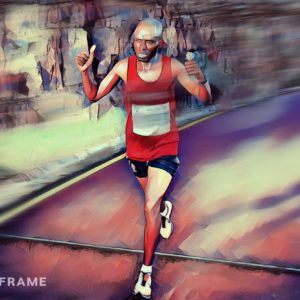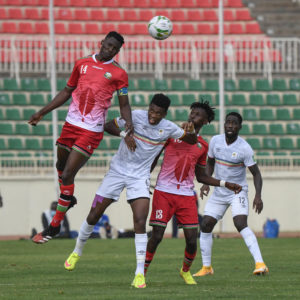André Ayew’s nostalgic but complex Al Sadd stint
The Ghanaian star is following in his father Abedi Pele’s footsteps at Nadi Al Sadd in Qatar. While his arrival at the club has been exciting, the bigger picture offers a complex view on world foot…
Author:
15 November 2021

“I started my career in Nadi [Al] Sadd,” says Ghanaian football legend Abedi Pele. “I went to Europe, and I won trophies there. Now, after 39 years…” The camera shifts to his son, André Ayew, who completes the sentence: “I am André, and I am now at Al Sadd to continue my father’s legacy and win more trophies.”
The nostalgic July video announcing Ayew’s signing by the Qatari league champions, which went viral in Ghana, revealed an almost unknown chapter in Pele’s legendary career that took place during the early, more “modest” days of Qatari football.
This four-decade circle encompassing Ghanaian football’s “first family” and the Qatari club offers an exciting view on one of Africa’s most fabulous stars, his legacy, and the relationship between money and the postmodern reality of African footballers in the Gulf.
A year before Qatar hosts the first Fifa World Cup held in the region, many international African football stars signed for clubs in the Middle East. Moussa Marega, Vincent Aboubakar, Christian Atsu, Patrick Eze and Knowledge Musona all settled in the Gulf this year, signing lucrative contracts worth millions of dollars with teams in Saudi Arabia and Qatar.
In the past, Middle Eastern leagues were popular destinations for veteran footballers to earn a last significant paycheck before hanging up their boots. But this is no longer the case. All the players mentioned above have enough good years left in them to have played for top or medium European leagues.
Ayew’s arrival in Qatar is no different in terms of salary. At 31, he is reportedly contracted at $220 000 (about R3.25 million at the time of signing) a month for two years, with the option of a third year.
But in terms of legacy, culture and symbolism, the Black Stars skipper’s landing in Doha is above the other marquee African signings in the region. Idolising money and overly lucrative contracts are part of a football reality in which Middle Eastern club owners play a massive part, but this transfer had more to it in terms of heritage.
Different days in Qatar
Pele was one of the first African footballers to make it internationally, and his initial games outside Ghana were at Al Sadd. “When Abedi Pele joined Al Sadd in 1982, it was counted as a random move,” says Ahmed Hashim, the co-founder of Qatar Football Live and an avid Al Sadd fan.
“He was 18 and an Al Sadd official travelled to Ghana to get him to sign.” A rising star in Ghana, his fans reportedly tried to stop him from going. “Abedi was initially hesitant … concerned that he’d feel alone and scared there without anyone who had the same skin colour as his.” Pele didn’t know there were people of all colours in Qatar. But at his first training session, he met Mubarak Ghanim and, according to Hashim, it “helped to relieve his concerns”.
Those were different days in Qatari football. There was no Aspire Academy or a World Cup in sight, and neither were there millions of dollars on offer for proven or older international players. “This was the kind of transfer Qatari clubs were looking [for] at the time,” says Hashim – young, talented and cheap footballers.
Different sources say Al Sadd got Pele for a flat fee of around $1 000. He trained at the Msheireb school grounds and lived in a flat above an Indian restaurant in Najma, one of Doha’s older districts.
Related article:
But did Pele have a tangible impact on the local game in Qatar? “We have very little archival footage or documents from that era, but from what I could find out, neither did Abedi stay for long nor did he win anything with the club,” says Hashim. “However, he did play and had a big role in the infamous 1983 Amir Cup final against Al-Arabi, which rankles Al Sadd fans to this day.”
It was a tight match. Al-Arabi took the lead in the 80th minute with a powerful free kick from their Brazilian star Geraldo. “In the 87th minute, Abedi Pele advanced into the box and was brought down by [the] Al-Arabi keeper.
“The referee blew his whistle after some thought, but not for a penalty. He bizarrely called for an indirect free kick and Al Sadd players were furious. A fight broke out and the Al Sadd manager told his players to walk off the pitch. The referee brought the game to an end immediately, but the Al Sadd players did not collect their runner-up medals. Instead, they went away to celebrate as ‘winners’.”
To this day, Al Sadd fans claim that referee Mustafa Ezzat was a youth team coach at Al-Arabi at the time. “He retired from refereeing after that game,” says Hashim. “Al Sadd officials released a statement expressing their symbolic motion of no confidence in the Qatari Football Association, whose president at that time was Sultan Al Suwaidi, a former president of Al-Arabi.”
A family of footballers
Having already left Ghana likely made it easier to sign for FC Zurich in Switzerland. We’ll never know what would have happened to Pele if he’d not signed for Al Sadd, but Ayew said after joining the club that “my father played here and this is the club that gave him the opportunity to leave Ghana”.
A few months in, Ayew can already tick off one thing his father didn’t do for Al Saad: win the Amir Cup without controversy. He has also surpassed his father’s international appearances for Ghana with 100 caps while his father earned 73. Under continuous comparisons to his father, Ayew has developed into Ghana’s national team and football leader. He dragged Ghana to the play-offs of the World Cup qualifiers, and if the Black Stars get past that last hurdle he will lead his side next year in familiar territory.
Ayew was born André Morgan Rami Ayew in Seclin, France, a commune not far from the city of Lille, where his father was playing on loan from Marseille. Football defined Pele on and off the pitch, so it wasn’t surprising that his sons followed in his footsteps. And Ayew comes from a family of footballers. His uncles Kwame and Sola were internationals for Ghana, his younger brother Jordan has played with him at several clubs throughout their careers and is now a forward for Crystal Palace, and his older half-brother Ibrahim plays for Europa FC in Gibraltar.
Related article:
Ayew has had a dream career. He walked in his father’s footsteps at Marseille, and became a club legend in Wales with Swansea and the beloved son of millions of Fenerbahçe fans in Istanbul.
“My goal is to win titles, make the fans happy, strive hard and try to win the AFC Champions League,” Ayew said in July about being at Al Sadd. But Hashim says the latter “will be extremely difficult for them in 2022 as they will have to play without their Qatari internationals”.
That Ayew described it as the club’s main target shows that he has embraced Al Sadd’s ethos and its desire to win a third Asian title, more than a decade after the team’s last triumph, says Hashim. “Looking at his performances, celebrations, TV interviews and social media presence so far, one can say that he has settled in nicely in Doha and is in sync with his teammates.”
Shiny objects
The nostalgia surrounding Ayew’s move to Al Sadd highlights the power of sportswashing. Qatar and the Middle East’s influence in Europe is reshaping football. Their oil wealth is bankrolling efforts to change the way Western audiences view them, and there has been a strong push to acquire clubs, host big sporting events and lure talent.
A Saudi-led consortium purchased Newcastle United in a controversial deal and as preparations for the 2022 Qatar World Cup speed up, so does criticism from different parts of the world. Issues such as worker conditions on construction sites, the number of casualties while building the stadiums and the country’s questionable human rights record are being drowned out by the shiny objects the region is acquiring through football.
Related article:
It’s no wonder, then, that this chapter in Ayew’s career is seen as exciting, a connection between past and present, with no mention of the suffering in between. It reminds the world that Qatar had a football culture in the 1980s, even though the story isn’t told often or regarded highly in Europe. After all, would Pele still end up in Marseille, winning the prestigious Uefa Champions League, if he hadn’t left Ghana for Al Sadd?
With Ayew already a made man, it will be interesting to see what this chapter with Al Sadd does for him, apart from further filling his pocket.



